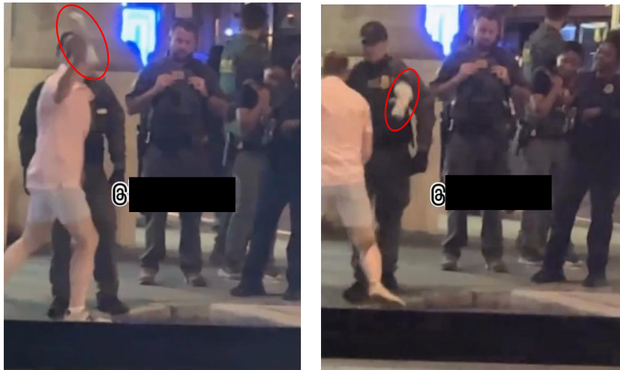Washington — A man who was charged with throwing a sandwich at a federal agent was found not guilty of one count of misdemeanor assault after a jury trial in Washington, D.C.
The acquittal of the man, Sean Dunn, comes after federal prosecutors failed to secure a felony indictment against him from a grand jury in Washington in the immediate aftermath of the incident. He instead faced a federal misdemeanor assault charge for allegedly assaulting, resisting, opposing, impeding, intimidating and interfering with a federal officer.
According to charging documents, Dunn threw a “submarine-style sandwich” at a Customs and Border Patrol officer stationed at a busy intersection in Northwest Washington in August. The incident was widely publicized and quickly became a symbol of resistance against President Trump’s federal policing crackdown and National Guard deployment in the nation’s capital, which is now in its third month.
In video of the incident that was cited in the charges and played in court, Dunn can be seen yelling at the agent and other officers in his vicinity before throwing the wrapped sandwich at the officer’s chest. Dunn attempted to flee on foot before being apprehended, documents and video of the incident shows.
According to the affidavit, Dunn yelled, “F*** you! You f***ing fascists! Why are you here? I don’t want you in my city,” before crossing the street. He later returned and threw the sandwich.
Justice Department
“He did it, he threw the sandwich,” Dunn’s attorney Julia Gatto said in her opening statement to a D.C. jury, adding their client has “very strong feelings” about the Trump administration’s influx of federal law enforcement into D.C.
Gatto called the viral incident a “harmless gesture that did not, could not, cause injury.”
Customs and Border Patrol Agent Gregory Lairmore, who was hit with the footlong sub, testified Tuesday, saying that he caught most of Dunn’s anger and attention before being hit in his ballistic vest with the Subway sandwich.
To laughs from the crowded courtroom, Lairmore said he “could feel it through his ballistic vest” and it “exploded all over” him. He said he “could smell the onions and mustard” on his uniform, and even had an onion string hanging by his police radio later that night. The fast-food mustard, he said, stained his shirt.
Dunn did not testify in his own defense, and his legal team did not present a counter to the Justice Department’s arguments in the case. Instead they moved to dismiss the case, but that was denied by U.S. District Judge Carl Nichols, who oversaw the trial.
During closing arguments in front of a fully packed courtroom, prosecutors said that “this case is not about someone with strong opinions … it’s about an individual who crossed the line.” They said Dunn had the right to express his anger at the federal agents, but he did not have the right to strike them, “even with a sandwich.”
“Here we have the defendant, throwing a sandwich, but he’s throwing it hard,” the prosecutor said. “That meets the definition of force.”
Dunn’s attorney, Sabrina Schroff, then argued to the jury that “the sandwich that was thrown in this case was not forcible,” and equated her client’s actions to that of a child’s bedtime temper tantrum.
Schroff said that when a child “takes that stuffed animal with which he sleeps … and throws it at you … Are you offended? Are you scared you might suffer bodily injury? No.”
She also said Lairmore could not have been assaulted because the sandwich throw did not place the officer in “reasonable fear of immediate bodily harm.”
“Think about where the sandwich landed,” Schroff said, arguing that Lairmore’s bulletproof vest that Dunn threw the sub at was “definitely going to keep you safe from a sandwich,” if it protects against gunfire.
“A footlong from Subway could not and certainly did not inflict bodily harm,” Schroff said.
“This isn’t just a sandwich, this is a seven minute tirade,” prosecutors argued in their rebuttal.
After his arrest, Dunn was fired from his job as a paralegal in the Justice Department. According to a Justice Department source, Dunn worked at the Office of International Affairs within the department’s Criminal Division as a paralegal.

